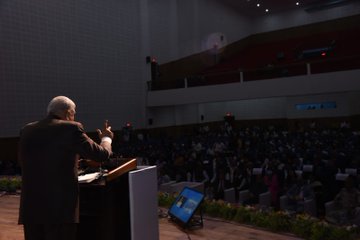Education is the most effective tool for transformation and progress of the society – Vice President
The Vice President, Shri Jagdeep Dhankhar today said that education is the most effective and transformative mechanism to bring about equity, equality and progress in the society. “Nothing can change societal conditions more than people getting educated,” he underlined.
Addressing the 21st convocation of Dibrugarh University in Assam today, the Vice President urged the students to be “agents of change” and work for bringing about positive changes in the society. “You are makers and warriors of Bharat in 2047 when the nation will celebrate the centenary of its independence,” he told them.
Describing competition as the best Guru, and fear as the worst enemy, Shri Dhankhar asked the students to dream big and never take stress. “Have a dream but do not be just a dreamer, be a doer,” he told them.
Praising the Eight North Eastern States as the “Ashta Laxmis” of India, the Vice President said without their growth and contribution, India’s growth will remain incomplete. He also commended the Dibrugarh University for its work towards preserving the linguistic diversity and literary traditions of the region. Preserving our languages is very important as they have evolved over thousands of years, he said.
Expressing happiness over the inclusion of North East in India’s mainstream narrative in Amrit Kaal, the Vice President praised NCERT and Indian Council of Historical Research (ICHR) for highlighting the contribution of unsung heroes of the North East, in our history and freedom struggle.
Commending the government’s focus on improving physical, social and digital infrastructure in the region, Shri Dhankhar said that the North-East is emerging as the land of opportunities. Mentioning various projects e.g. Bogibeel rain-cum road bridge, 375 road projects, rise of airport network from 9 to 17 and setting up of 190 new educational institutions in North Eastern region, he highlighted that new avenues and vistas are now available to youth to unleash their energy.
Describing India’s growth story as ‘unstoppable’, the Vice President expressed confidence that by the end of decade, we’ll be the world’s third largest economy. Referring to several milestone achievements such as providing digital IDs (AADHAR) to 99.9% Indians, JAM trinity, MUDRA and PM Kisan Samman Nidhi, he said that even IMF has praised India’s world-class digital public infrastructure calling it as a model for other nations undergoing digital transformation.
Describing India as the Mother of Democracy and world’s most vibrant democracy, the Vice President questioned why some of us decry our democracy within and outside the country. He also underlined that freedom of expression has not been subjected to any enforced silence in India.
Calling Parliament as the temple of our democracy, the Vice President emphasized that it is a platform where issues of public interests are debated, deliberated, discussed and decided, but prolonged disruptions, he added, undermine the esteem and confidence which people repose in their representative institutions. Therefore, he called for generating an ecosystem so that our parliamentarians respond positively to the spirit and essence of the founding fathers of our constitution.
Congratulating the passing out students, Shri Dhankhar asked them not to forget their Gurus and their alma-mater. “As alumni of this institution, you should contribute for the welfare of your University in whatever form you can,” he said.
On this occasion, the Vice President conferred D. Sc. and D. Litt degrees (Honoris Causa) to eminent personalities of Assam. He also planted a tree sapling at the University campus.
Shri Gulab Chand Kataria, the Governor of Assam & the Chancellor of Dibrugarh University, Dr. Himanta Biswa Sharma, Chief Minister of Assam, Shri Rameswar Teli, Union Minister of State of Petroleum and Natural Gas and Labour and Employment, Dr. Ranoj Pegu, Minister of Education, Govt. of Assam, Prof. Jiten Hazarika, Vice-Chancellor, Dibrugarh University, members of the board, Director, faculty, staff, students and families of the graduating students were present.

